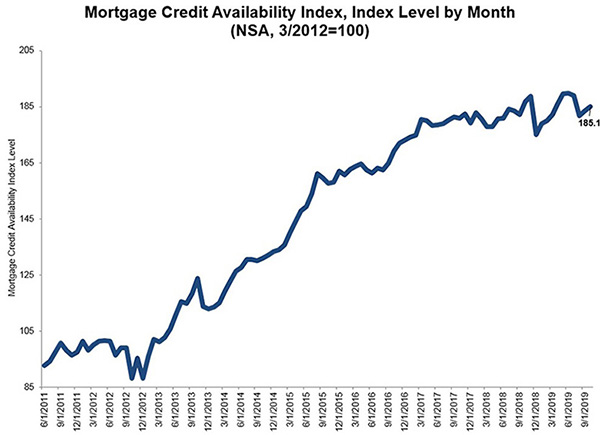
October MBA Mortgage Credit Availability Index Up 1%

Mortgage credit availability increased in October, the Mortgage Bankers Association reported this morning.
The MBA Mortgage Credit Availability Index rose by 0.9 percent to 185.1 in October. The Conventional MCAI increased by 2.4 percent, while the Government MCAI decreased by 0.9 percent. Of the component indices of the Conventional MCAI, the Jumbo MCAI increased by 3.1 percent and the Conforming MCAI rose by 1.3 percent.
“Mortgage credit availability increased in October, driven mainly by an increase in conventional loan programs, including more for borrowers with lower credit scores, as well as for investors and second home loans,” said Joel Kan, MBA Associate Vice President of Economic and Industry Forecasting. “Credit supply for government mortgages continued to lag, declining for the sixth straight month. Meanwhile, the jumbo credit index increased 3 percent to another survey-high, as that segment of the market stays resilient despite signs of a slowing economy.”
The report analyzes data from Ellie Mae’s AllRegs Market Clarity business information tool. A decline in the MCAI indicates lending standards are tightening, while increases in the index are indicative of loosening credit. The index was benchmarked to 100 in March 2012.
The Conventional, Government, Conforming and Jumbo MCAIs are constructed using the same methodology as the Total MCAI and are designed to show relative credit risk/availability for their respective index. The primary difference between the total MCAI and the Component Indices are the population of loan programs which they examine. The Government MCAI examines FHA/VA/USDA loan programs, while the Conventional MCAI examines non-government loan programs. The Jumbo and Conforming MCAIs are a subset of the conventional MCAI and do not include FHA, VA, or USDA loan offerings. The Jumbo MCAI examines conventional programs outside conforming loan limits, while the Conforming MCAI examines conventional loan programs that fall under conforming loan limits.
Expanded Historical Series
The Total MCAI has an expanded historical series, which gives perspective on credit availability going back 10 years (expanded historical series does not include Conventional, Government, Conforming or Jumbo MCAI). The expanded historical series covers 2004 through 2010, and was created to provide historical context to the current series by showing how credit availability has changed over the past 10 years–this includes the housing crisis and ensuing recession. Data prior to March 31, 2011, was generated using less frequent and less complete data measured at six-month intervals and interpolated in the months between for charting purposes. Methodology on the expanded historical series from 2004 to 2010 has not been updated.
About the Mortgage Credit Availability Index
The MCAI provides the only standardized quantitative index solely focused on mortgage credit.
The MCAI is calculated using several factors related to borrower eligibility (credit score, loan type, loan-to-value ratio, etc.). These metrics and underwriting criteria for more than 95 lenders/investors are combined by MBA using data made available via the AllRegs Market Clarity product and a proprietary formula derived by MBA to calculate the MCAI, a summary measure which indicates the availability of mortgage credit at a point in time. Base period and values for total index is March 31, 2012=100; Conventional March 31, 2012=73.5; Government March 31, 2012=183.5.
To learn more about the Ellie Mae AllRegs Market Clarity platform visit http://answers.allregs.com/MCAI-Market-Clarity. For more information on the Mortgage Credit Availability Index, including Methodology, Frequently Asked Questions and other helpful resources, visit www.mba.org/MortgageCredit or contact MBAResearch@mba.org.
